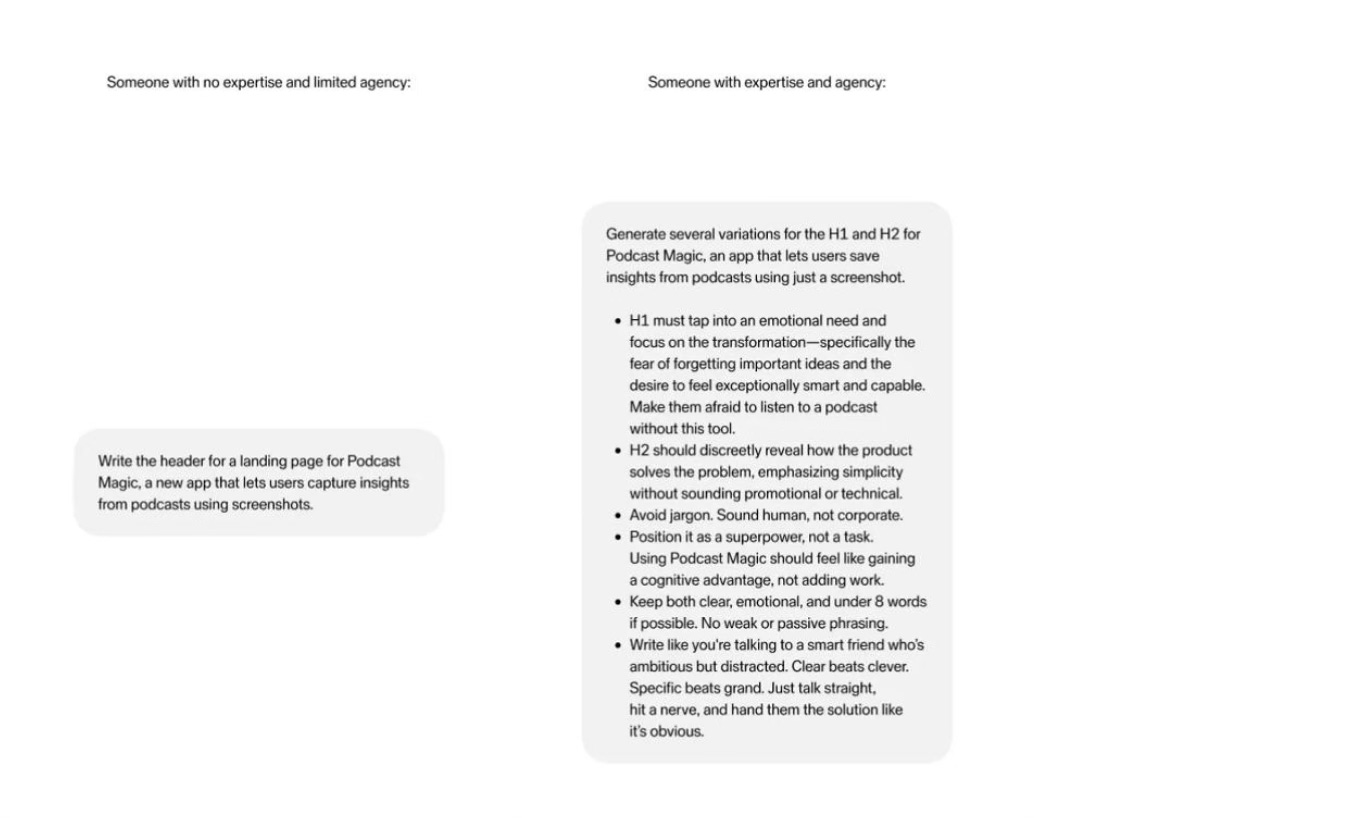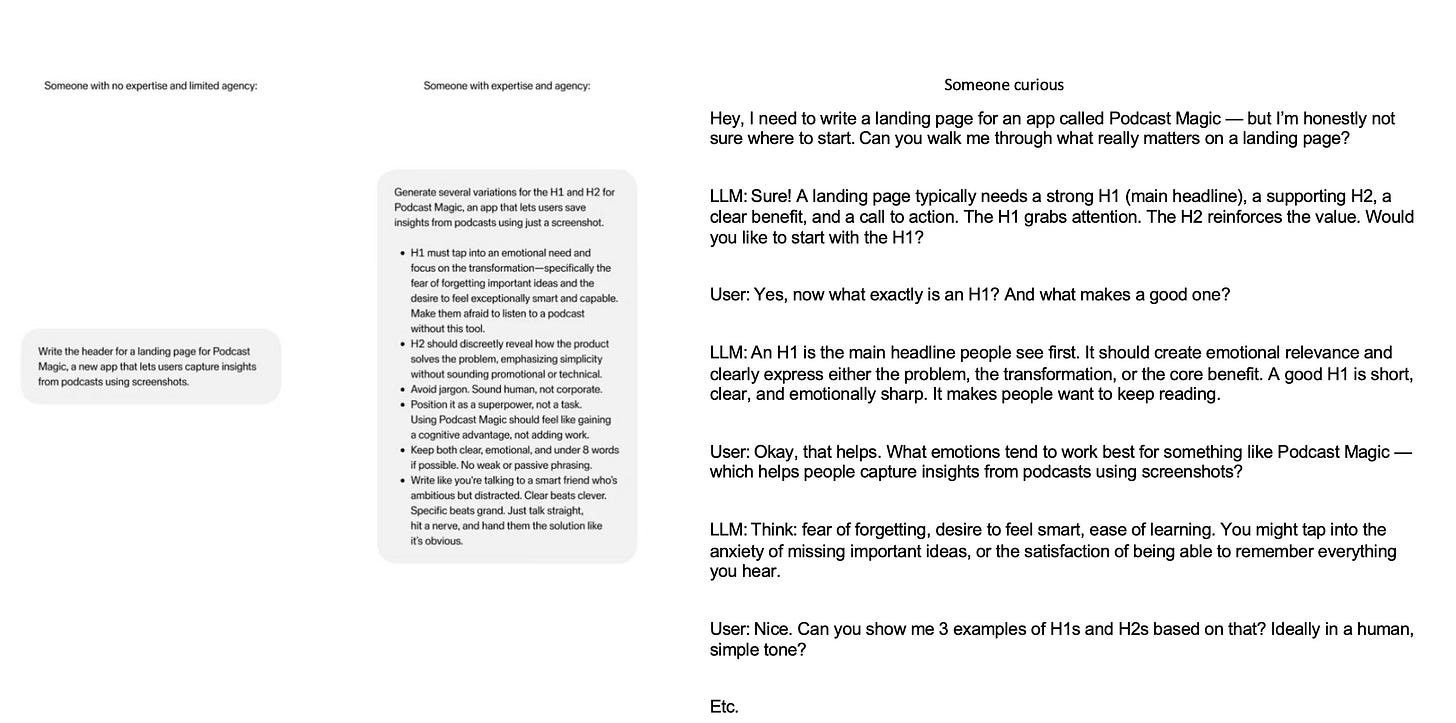Aren’t you just fed up with the endless guides, tutorials, and so-called “ultimate” methods for learning how to prompt like a pro? We’re not learning anymore, we’re being trained like pets.
Is that really the goal? Polishing syntax… instead of sharpening thought?
Then recently, I stumbled upon a presentation by
, founder of the app Sublime, and one of the 50 most influential tech voices on Substack.One slide in particular stopped me in my tracks. This one:
The core message is sound. Azout is pointing to two key ideas.
First: garbage in, garbage out. The shallower the input, the emptier the result.
Second: the more expertise one has, the better the prompt. And I’d add this: expertise also helps you judge whether the output is worth anything at all.
Up to this point, the argument is difficult to dispute.
What unsettles me, however, is the underlying suggestion that expertise alone holds the key. That it should reign supreme in the interaction between humans and machines.
Of course, expertise is valuable. But it also carries a risk. It can become fixed, rigid. It convinces us we already know, and in doing so, it can quietly extinguish curiosity.
That second prompt might indeed be more impressive. It reflects knowledge, precision, and control. But it is still a closed system. A well-built structure, yes, but one that begins to resemble a cage.
This is where the real question begins to emerge. In an age defined by artificial intelligence, perhaps we should no longer be asking how to become more intelligent in the conventional sense. Perhaps the more urgent question is how to remain alive to complexity, to uncertainty, to thought itself.
It may be time to reconsider what we mean by human intelligence. Not as the accumulation of facts, but as a capacity for adaptation, discernment, and active awareness. As Jean Piaget wrote, “Intelligence is what you use when you don't know what to do: when neither innateness nor learning has prepared you for the particular situation.”
This is where we need to distinguish between intelligence and wisdom.
To be wise is not to know more, but to know better. It means keeping our thinking alive and curious, capable, at times, of thinking against itself. A kind of thought that does not seek to dominate the machine, but to remain free in relation to it.
Which is why I now read that slide differently. Not as a contrast between naïveté and mastery, but as an invitation to something else entirely. To me, it speaks of curiosity. The kind a child has when they ask “why?” over and over. A curiosity that both wonders and digs deeper.
This is how I see it:
This is the spirit I try to bring to prompting. I couldn’t include the entire exchange here, but the process matters more than the content. I question, I test, I rephrase. The AI responds, and I respond to it. I adjust, I iterate. Eventually, I ask for a synthesis of key insights. And then I ask one more question: Have we missed something essential?
This is about structuring thought, building reasoning. A true prompt is not a shortcut, it is an extension of inquiry. It is not about outsourcing thought, but engaging it more fully. In that sense, I’m not simply executing a command. I’m learning, not about the machine, but about myself. About what I’m really trying to find. This kind of prompting is not automatic; it is reflective, iterative, critical.
And in that movement lies something rare and necessary: an intelligence that refuses to settle.
If I were to sum it up, I would say this:
Prompting, at its most basic, is the act of asking for something.
Prompting well is the effort to obtain it as precisely and clearly as possible.
But the art of prompting lies elsewhere. It is the willingness to interrogate the question itself. To examine the assumptions behind what we ask. To better understand what we are truly seeking. And, in the process, to learn.
This is why I am not interested in simply becoming more fluent in machine language. Nor do I aspire to resemble the machine in the way I think, speak, or solve.
What I want—what I believe we should all want—is for each exchange to leave us a little more free. A little more clear-minded. Not for the sake of productivity, but for the sake of deeper thought.
Perhaps this is what a real prompt should be: not just a query issued to a system, but a question that reshapes the one who asks it. A search that transforms the seeker.
MD







Love this!
Asking the AI how to prompt AI is overrated. Humility and curiosity become so much more valuable.
Thanks for this reflection! This is pure gold for me “A search that transforms the seeker.”